BibTeX | RIS | EndNote | Medlars | ProCite | Reference Manager | RefWorks
Send citation to:
URL: http://mjiri.iums.ac.ir/article-1-4004-en.html

 , Forouzan Salehi
, Forouzan Salehi 
 , Mostafa Qorbani
, Mostafa Qorbani 
 , Mahsa Rostami
, Mahsa Rostami 
 , Gita Shafiee
, Gita Shafiee 
 , Zeinab Ahadi
, Zeinab Ahadi 
 , Shayesteh Khosravi
, Shayesteh Khosravi 
 , Vahab Rezvani
, Vahab Rezvani 
 , Farzaneh Sadeghi Ghotbabadi
, Farzaneh Sadeghi Ghotbabadi 
 , Maryam Ghaderpanahi
, Maryam Ghaderpanahi 
 , Zahra Abdollahi
, Zahra Abdollahi 

Background: Improper nutritional knowledge is one of the most important causes of nutritional problems, which can affect practice and cause more complications. The aim of this study was to assess the association between nutritional knowledge, attitude and practice (KAP) of Iranian households with socioeconomic status (SES).
Methods: The study population was 14,136 households (57 clusters of 8 individuals in each province) who lived in urban and rural regions of 31 provinces of Iran. The sample size of the study was selected using multi-stage cluster sampling technique. A structured questionnaire and interview with the qualified person in each family was used to collect data. The questionnaire included demographic, SES and nutritional KAP questions. Using principle component analysis, some variables including household assets, occupation and education level of the heads of the families and respondents and the number of family members were used to construct family SES. The SES was categorized as good, moderate and weak. Pearson’s Chi-square test was used to analyze categorical variables.
Results: The percentage of knowledge about growing up, acquiring energy and being healthy as reasons for eating food was 24.1%, 44.8% and 54.7%, respectively. Only 69.7%, 60.5% and 52.5% of the participants had knowledge of identification of meat and legumes, grain and dairy group, respectively. More than 97% of the participants had a favorable attitude toward importance of nutrition in health. The nutritional knowledge linearly increased with increasing SES. Families with good SES significantly consumed more fruit, vegetable, dairy group, red meat, chicken and poultry, fish and egg while sugar consumption was significantly higher in families with weak SES (p<0.05).
Conclusion: SES can influence the rate of nutritional KAP. Some policies should be considered to increase nutritional KAP especially in lower SES group in the society.
| Rights and permissions | |
 |
This work is licensed under a Creative Commons Attribution-NonCommercial 4.0 International License. |



